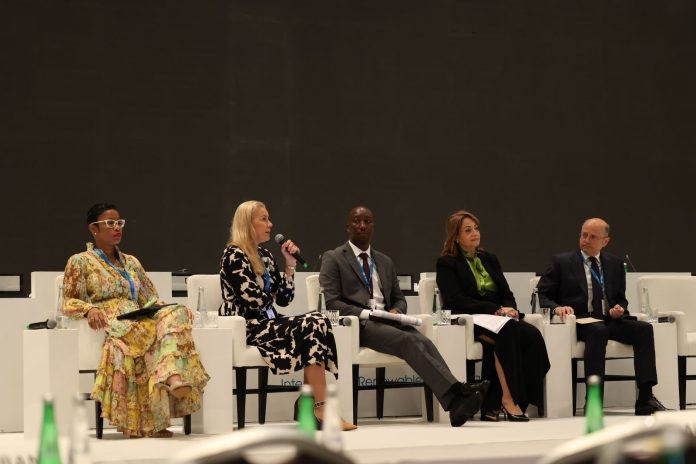A new report released Wednesday by the International Renewable Energy Agency (IRENA), highlights the shift towards renewable energy as a means to bolster energy independence.
It emphasises that while traditional geopolitical factors like market manipulation and infrastructure disruptions still matter, their influence is likely to decrease in a renewable energy-focused context.
The report suggests that transitioning to electrification and increasing reliance on renewables can help mitigate risks such as fuel weaponisation, market manipulation, supply chain interruptions, and environmental disasters such as oil spills.
During the Ministerial Roundtable on Geopolitics of Energy Security, Vice Minister of Energy of the Ministry of Energy and Mines for Dominican Republic, Rafael Orlando Gómez Del Giudice highlighted the importance of renewable energy in the changing energy security landscape.
The roundtable aims look at future energy security challenges as the world moves towards renewable energy.
Panelists explored how renewables enhance energy security, impact local production and global markets, and the importance of international cooperation for a secure renewable future.
Hans Olav Ibrekk, Norway’s Special Envoy, Climate and Security, reflects on IRENA’s work on geopolitics of energy transition.
“Energy transition is a major geopolitical force, and it will actually reconfigure many elements of international politics that have shaped the global system since the Second World War.
This will affect the sources of national power, the process of globalisation, relations among great powers, create brand new dependencies, and also impact the ongoing economic convergence of developed and developing countries,” he stated.
“Geopolitical risks is not an argument for inaction – quite the contrary – approaching the clean energy transition with a clear-eyed understanding of the risks is essential to tackling the climate crisis,” said Olav Ibrekk.
Elizabeth Press, IRENA Director of Planning and Programme Support, delivered a scene-setting presentation, showcasing the new report and talking about the multi-dimensional approach to energy security.
“86 percent of the population lives in the next importing country,” said Press.
She presented key findings from the Geopolitics of the Energy Transitions: Energy Security and the need for a collaborative effort and a multi-dimensional approach needed to energy access.
“The conversation that we can have in this setting is critical as a framework for the investment to go into the right areas in a sustainable way.
Visiting Professor of Business, New York University Abu Dhabi, John Defterios summarised some of the recent challenges and bottlenecks in the energy transition.
He also made note of how these moments also serve as an opportunity for countries can rally together to chart the course away from fossil fuels to meet the 1.5°C energy scenario.
Kadri Simson, Commissioner for Energy, European Commission provided an overview of the current situation in the region.
“We are prioritising energy transition and energy efficiency in order to reduce our dependency on fossil fuels.
“We have replaced a significant share of natural gas with renewables, and we have been able to stabilise markets in Europe. Last year, 70 GW of renewables and 3 million heat pumps were installed across Europe last year. By bringing down the cost of technology, renewable will become more affordable and more widespread in Europe.”
She also highlighted a vital importance of renewables in the energy mix to ensure affordable energy access to all.
“Our next target is to remove fossil fuels in power generation and move rapidly to renewables. However, despite the technologies being developed, as a small island nation not connected to the energy grids of regional countries, our recent efforts are to connect to Israel and Crete.
“This means that Cyprus will be connected to Europe. If we manage to get this niche market of electricity to the major of the EU, it is like having a unified energy market that Cyprus can enjoy,” said George Papanastasiou, Cyprus Minister of Energy, Commerce and Industry, on the challenges and opportunities faced by small island nations in their efforts to secure energy access through interconnectivity with regional countries.
U.S Deputy Assistant Secretary for Energy Transformation, Bureau of Energy Resources, Anna Shpitsberg said diversifying investment is crucial to mitigate energy risks, not create new ones.
“The U.S is partnering with Korea to invest in critical minerals for the energy transition, ensuring a sustainable and secure supply chain.”
Korea’s Director General for Renewable Energy Policy, Jung Kyung-rok said that international cooperation and open discussion in necessary to ensure progress.
“Energy security is an important topic that must be tackled on the international level and IRENA’s report is a welcome study on the status and new approach to understanding energy security.
Francesco Corvaro, Special Envoy on Climate, Ministry of Foreign Affairs, Italy said our countries are neither resilient and nor independent.
“We are working a lot at the international level and the G7 to increase renewable energy installation to reduce dependence on international energy markets and to mitigate risks associated with geopolitical tensions,” he said.
He stressed the need for new infrastructure, which will also create job opportunities for young people.














